Blog #12 – 1st Rotation – APUSH students take over the blog!
Please choose one of the following questions to answer for your blog. These questions come from your colleagues, so enjoy.
1. Do you feel that Theodore Roosevelt’s plan of consumer protection is American or anti-American? Teddy passed various laws such as the Pure Food and Drug Act and the Meat Inspection Act. The government took on a new role, becoming more involved in people’s lives. But does more government ‘interference’, as some would call it (others have called it socialism!), represent American values? Would you have done anything differently? – Fred A.
2. Muckrakers played in big role in politics when they began to write in the early 1900s. Today, journalists also find sources of corruption and abuse to publicize – 60 Minutes, Dateline, regular newspapers and magazines + bloggers. Identify sources of muckraking today and compare reactions and effects of the writing with the previous generation of muckrakers.
– Also, TR did not like the muckrakers because he felt that they just talked trash and didn’t make any suggestions or try to help fix things and were just critical and negative. Do you believe that today’s muckrakers are just a negative source like TR did or do they do a good job of exposing corruption and abuses? – Eleanor C.
3. Nike is like Standard Oil in how they monopolize the shoe and clothing industry. But Nike is also like any other type of monopolistic business in the Progressive Era. Nike pays young kids in Asia to do very hard labor for very low wages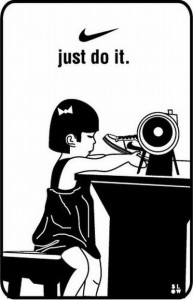 . It is much like how things used to be here. Do you belive it is ethical what Nike is doing to young kids in Asia? Why or why not? – Declan G.
. It is much like how things used to be here. Do you belive it is ethical what Nike is doing to young kids in Asia? Why or why not? – Declan G.
4. Do you think that the reasons America began imperializing overseas in the 1890s (new markets, manifest destiny, naval power, and Anglo-Saxon superiority) are legitimate reasons to expand? Why or why not? If not, why do you think more people weren’t protesting America’s imperialist policies? – Claire F.
5. If you were going to cast a movie about the late 1800s business tycoons like Rockefeller, Carnegie and Morgan, who would you cast and why? – Patrice B.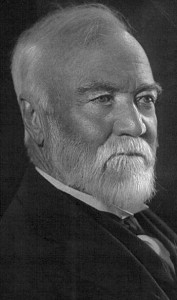
6. Compare our federal government today to the federal government during the progressive era. Do you feel the (federal) government should be more or less involved in social issues such as the Headstart Plan* and environmental regulations**? If more, what else do you suggest the government do? If less, what do you suggest the government not do? – Lucy B.
*A simple summary of the Headstart Plan can be found by clicking the link.
**There have been environmental regulations proposed such as the US federal government forcing every citizen to have only fluorescent lightbulbs in their homes in two years (fluorescent lightbulbs, the ones with mercury in them, conserve energy, but are a health and environmental risk)
7. Teddy Roosevelt had a strong sense of conserving the environment for future generations before he became president and enacted laws during his tenure. Today, when we talk about saving the environment, people mention global warming and debate whether or not it’s a hoax. It seems to me that this debate just distracts from the overall point that we could be doing more, like TR, to help conserve natural resources since as Americans, we consume more energy and stuff, per capita, than other people in the world. What can we do to help make the planet a better place to live in? – Elizabeth B.
8. James Cameron’s Avatar was a tremendous hit last year, but it also had amazing plot similarities to the 1990 Western, Dances With Wolves. Both are sagas about Americans imperializing another land and shoving people off of it, regardless of the consequences to the native (Navi) people. If you’ve seen either movie, can you view either one as a critique of American imperialism? Why or why not? – David B.![]()
9. If you could go back in time and decide whether America would go to war against the Spanish in 1898, would you? Why or why not? Please explain. – Raven G.
10. Imperialism is a form of government that Americans shunned. We have stood and fought against it in World Wars 1 and 2, yet we are imperialists ourselves and are dependent on other countries for our personal comfort and economy. Would you be true to America’s democratic roots and fight imperialism? Or would you be an imperialist that conquers and controls other countries? Why do you believe so? – Braxton A.
11. After the Spanish American War, America liberated the Philippines from Spain, but didn’t grant them independence. If you had to decide back then, would you rather see America as a laid-back nation that watched over the world, or would it be better to become an active world power, helping other nations (which sometimes came under the banner of imperialism)? Why? – Larry G.
12. What do you think the implications of the US foreign policy are now that Egypt’s old president, Hosni Mubarek, is out of office? Remember that Egypt has control of 5% of the flow of oil through the Suez Canal and because we are allies w/ Egypt. – Kaylee B. 
13. What business/society problems are around today that muckrakers would or should attack? How would they attack them- would it be through articles still? What results might these exposes bring? Explain. – Lizzie D.
14. In the last half century, the US has entered many countries under the mission of “spreading democracy”. Do you think this is a form of imperialism and is it fair for us to force our values on other countries? Why or why not? – Cameron
15. In 1960 during the height of the Cold War, the United States placed a partial embargo on newly-communist Cuba. Then, after the Cuban Missile Crisis in the fall of 1962, President Kennedy enacted a travel ban to Cuba for US citizens. The ban, currently the world’s longest-standing embargo, still allows us to export goods to Cuba, but we can’t get bring anything back. Since the Cold War is over and Castro is almost dead, should the US lift the embargo with Cuba? Why or why not? – Evan D.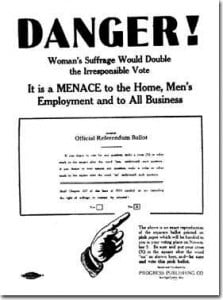
16. The Women’s Suffrage movement took a long time to impact national laws to get women the right to vote. Do you think if this would have taken place in current times that the suffrage amendment would have been easier or harder to pass? Would current events overpower the suffrage movement or would the Women’s Suffrage movement be at the top of the list? Why? – Stephanie D.
17. How do you think American life would be different if President McKinley hadn’t been shot in 1901? Would Teddy Roosevelt ever have become president? Would we still have national parks? Explain. – Katie D.
18. What are some of the problems of our progressive income tax (where the rich pay a higher tax rate than the middle class or poor)? Do they outweigh the benefits? Why or why not? – Ben C.
19. There were three main candidates during the election of 1912: Woodrow Wilson, Theodore Roosevelt, and William H. Taft. Each president had many views and approaches to the United States problems. Some were different from one another, and some were shared by two or all three. If you lived back in 1912 and were eligible to vote, which candidate would you have chosen and why? – Erick D.
20. Why would U.S. companies outsource jobs back in the early 1900s and now if so many people here need jobs here? – Alex C.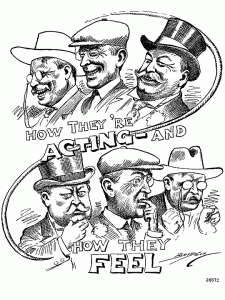
21. If Teddy Roosevelt was magically transported to the present day, what do you think his opinions would be of today’s politics, policies, and the wars in Iraq and Afganistan? Why? – Rachel G.


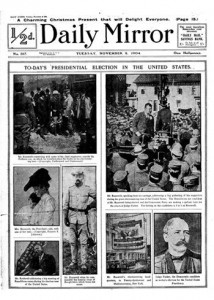
21. i feel if teddy roosevelt as magically transfered to the present his thoughts on the wars in the middle east would be supportive. teddy was such a manly man he probably would have wanted to hop on his horse and go fight!! but being on horseback in this day and age wouldnt get you to far in a war….with bombs guns and all of the technology we pocess today. but think about being brought to the future you wouldnt know anything at all everything would be really messed up and new to you, you woulndnt know a single soul it would feel so alone, i think that would factor into how teddy viewed everything and how he reacted. teddy roosevelt was a brilliant mind in the early 1900s. he woudlnt know much about today, so i think it would be better off if he wasnt brought back at all. overall teddy would support the war, i think that teddy roosevelt would support any war for that matter the man himself was completly fearless. he was most defently a one of a kind man, and we wont see another teddy roosevelt again.
Ben Hafen, 4th Hour
15.
I’ll admit that I don’t know the entirety of the whole US/Cuba relationships and politicking. It would make sense to me to end the enmity between our countries, as the Cold War is over. However, Castro is not dead; almost dead doesn’t quite cut it. As much as we may want to cut the embargo, Castro may not. Until then, we’re at an impasse.
What is required between our countries is communication. Because we’re America and because they’re Cuba, we’ve refused to really sit down and communicate. We just go with the 1960s flow and float on. I’m not sure if people have noticed or not, but we don’t live in the 1960s anymore. What’s the use of the embargo anymore?
Personally, I’m all for abolishing it. I just hope I’ll live to see the day when it is.
(needs 110 more words…)
While we’re still on the subject, one must ask, Why can’t people go to or from Cuba? If it’s for medical reasons, such as quarantining a virus or a parasite or something, that’s perfectly fine. But, if not that, why? We’re America! Don’t we want everyone to be happy and to experience the wonders of the American Dream and Capitalism?
Well…isn’t Cuba part of everyone?
I can perfectly understand if we don’t have room, physically or economically, for anymore people, but we do have room. We’re not at China’s level just yet, after all. We have room, we have new laws and policies, we have new tolerance, we’re done with the Cold War.
Why exclude Cuba?
8. I saw the movie Avatar and I think that it can definutely be considered a criticism of American imperialistic policies. First off, the very characters are examples of satire. The main “villain” of the movie is a power-hungry war hero, which to me just seems like unfair criticism of war veteran politicians, although in another satirical moment, the man is controlled by a corporation boss who sits on the sidelines, sending in other men to do his dirty work. The villain does not consider the native race of the planet as being able to think for themselves, instead he treats them as little more than obstacles in his quest for money. He uses tricks such as creating his own copies of the native people and sending them in to try to win the trust of the natives, before completely obliterating them. This seems to be criticizing American imperialism in the way we smash through countries to try to get what we desire, with no regards for the native people. The movie also seemed to (in a way way way overexaggerated fashion) embody the “brains over brawn” principle, with the scientists being the compassionate ones who had a conscience and helped the natives while the soldiers having no regards for the people.
3.
I believe that it is unethical what Nike is doing in asia. I think that Nike is exploiting the asian children’s desperate need for work, because there are so many people in asia, kids and parents alike will do almost any job for any amount of money. This is because asia has so many people that all the jobs get filled very fast so many people cant find work and they have to work in sweat shops. But just because the asian people are willing to work for such low wages, and most asian governments have no law against how little you can pay your workers, does that mean you should exploit them for your own personal financial gain? Nike and other companies that use sweat shops love it because they can get their products made paying very little but reselling at a higher price. For example, maybe Nike pays one kid 5 dollars to make a shoe that may take the child many hours to make, then Nike turns around and sells it to people for 50-60 dollars! That is a lot of profit-per-shoe and if there were no sweat shops, Nike and other companies like it, wouldnt even be in Asia.
14.
I think that in the US entering countries under the mission of “spreading democracy” is definitely a form of imperialism and it is not fair for us to force our views on another country. Forcing anything on someone else goes against our values and laws, this idea is slightly ironic. When anything is forced it crosses our main value: freedom. Force and freedom contradict each other. It was especially unfair because of the way people from our citizens treated people in the invaded countries. In addition, the governments we set up in these countries weren’t the best and tended to fail in the future.
One example of extreme unfairness is Hawaii. Going into Hawaii in the first place was iffy, but it was especially wrong when we over threw the Hawaiian Queen. We had not right to annex Hawaii and we went against our own values in doing this.
Our imperialism was not only unfair, but also selfish and greedy, and obviously so. Taking over the Philippines had nothing to do with the Spanish-American war. We also set up military bases in these countries and discussed the idea that if we took over the Philippines, trade with Asia would be easier. This idea was not only discussed, but used as an argument to convince people that we should take over the Philippines.
18.
A big problem that comes as a result of the progressive income tax is that, in some cases, it may drive people to spend their money instead of save it. If you spend your money on something expensive like say, a car, or an apartment you really can’t afford, then that large sum of money won’t go towards raising your income tax. Another problem is that it may encourage people to get some illegal business going on with their money. Want to make sure the government doesn’t tax your money? Easy, throw it into an account on a tiny island out of the country. Obviously this is illegal, but its almost as if the government is encouraging it. Or maybe just take all of your money out of the account and store a boatload of cash in your basement! The law is just asking for people to do stupid, illegal stuff with their money rather than just keep it safe like they should. To me, the biggest problem of all is that its just simply not fair. The tax punishes rich people for…working hard to get rich? The odds are, an upper class person that works in an executive position for a business puts in more hard work and long hours of stress than someone that has a minimum wage job and standard working hours, so shouldn’t this person be rewarded? They have the work ethic that if everyone in the country had would make us a powerhouse far beyond the likes of China and India, but this law almost frowns upon it.
Back during the Progressive Era, I think it was better for the U.S. to become an active world power and get in on imperialism. This was America’s chance to become a world super-power and it is necessary to capitalize when the opportunity is presented. Some of the processes and things we made different people go through may have been unethical and could have been done in a much better way. It is not right to liberate a country then not grant the people freedom, using them completely just so we can steal all of their natural resources and basically use the country’s natural products, leaving the people with nothing. However, if the United States didn’t get into imperialism, we might not be what we are today and the lifestyle that some Americans are used to might not even exist at all. Also, we might not be as diverse a nation as we are today either, because we saved them from other countries, liberated their homeland from foreigners. I believe the American people during this era were brainwashed by the government from not think that America was becoming an empire, we wanted to be known as a capitalist and democratic society; the word empire had a bad ring to it. The good thing about the entire situation is that we can look on the past, look at mistakes we made, and if we ever need to further our “empire” then we can do it in a civil, fair way, without any casualties or turmoil.
# 3.
Now this may sound harsh but this is just a personal opinion. I do believe it is ethical what Nike is doing to young kids in Asia. I feel that most of the countries in Asia are in poverty; therefore it is expected that children work to support them and their families. One of the many reasons that I feel that Nike and other companies take their businesses elsewhere especially in third world countries, is because there is low pay and children will accept. Now, I find that both children and Nike (mainly Nike) are not benefiting. As long as Nike doesn’t expose their child workers to conditions that can be dangerous, and is not making them work a ridiculous amount of hours, or being physically hurt or punished, and the parents are aware and accepting of their children being involved child labor then it should be acceptable. When children are being paid 66 cents; however then it can major problem, but if there are no problems listed above (which I’m sure there are) then actions should be taken in place, and needs to be fixed.
I believe that jobs were out sourced back then for the same reason they are outsourced today, to create a cheaper product. Companies are in the business to make a profit and if that means sacrificing American jobs that what will, did, and is happening. Back then their weren’t a lot of rules and regulations to protect workers and I believe that that is what gave companies their ability and power to send jobs overseas. I am not angry at the people in the high offices of the company because they did what they had to do to protect their interest and their companies interest and you cant really blame a person for that, their families need to eat too. I am sure that there were multiple ways that the companies could have kept jobs in the United States but as I mentioned I am sure that sending jobs overseas saved these companies bundles of money and brought their profits way up because it wasn’t costing a lot to produce the product.. I defiantly would have preferred that the companies keep jobs in the United States because I am sure that outsourcing ruined many households’ because parents and kids couldn’t get jobs. I don’t really see and end to this problem. Companies will always go with the cheapest product even if it means that their consumers are out of work. As long as people buy the product there is not really much incentive for the company to change their practices.
13. I believe that there are still muckrakers today, although the mainstream ones have taken to a different sort of muck. This muck seems to take a higher presence over the muck about our country and can be found in any source of media. Magazines that target celebrities and how to make them scandalous is a very prominent form of muckraking today. I think that the tabloid’s obsession is ridiculous and they could be exposing more important things. They could expose some of the ways the CIA gathers information or unfair cases such as Mumia and Leonard Peltier who have been wrongly accused and are still held captive. Another big thing they could bring light to is the Coca Cola fiasco. Rumors about the Coca Cola company doing horrible things in different countries have crossed the news and of course, Coca Cola denies it. I have seen muckraking websites for all of these, yet it is still ambiguous as to if all of it is true. If I were to pick a random person in the United States, they might not know about the scandals behind any of these issues. I believe the attack has already begun, through the internet, although people are either completely ignorant or don’t know what to think since it is extremely bias (like myself).
If these discoveries were to go mainstream, they would have to be acknowledged by major news sources. Since many Americans get their news from major sources, many would dig deeper into the issue and a new level of mistrust for the government would settle in. The companies would feel the heat as many Americans might protest or boycott. A new surge of uncovering secrets would explode and America would be furious. Then, the half truths and crazy exaggerations would become prominent, making Americans begin to wave off the prospect of anything too scandalous, and eventually coming back to where we are now. That is my prediction of what would happen if big company and government scandals were exposed to the mainstream.
I don’t believe that it is ethical for Nike to be treating the kids in Asia like they are. With such a large company and production of shoes and cloths, Nike should be treating the children like that. I also don’t believe it is fair for the kids because they don’t deserve that sort of treatment. No child should have to do hard manual labor especially for low wages. This is wrong for Nike to do because, have controlling such a large company, they can afford for better treatment.
I do believe that Nike does some things like progressive era monopolies though not everything is the same. For the companies during the progressive era didn’t outsource all of their jobs and all to Asia for cheaper wages. Though how they employed the children I do believe is completely immoral. It’s not so much that their employing children is bad. I personally believe that if the child wishes to get a job then by all means they should be allowed to get one. So long as they are within a reasonable age. But if they do employ the children I do in face think that they should give the children reasonable pay. I don’t believe that the very low wages that they have for the kids is good at all. I don’t think it necessarily should be as good as full time adult workers but it should be much better than what it is. One more thing that I believe is bad is that they are outsourcing the jobs. If the United States is having job troubles then an American company should bring its job openings to America instead of outsourcing them to some foreign country just to cut costs. This is bad because our economy could also use the boost of having the jobs in our country. But by not doing this the company significantly decreases the amount of jobs we could have and lowers our economies not only raising foreign competitors.
I do belive what nike does is wrong, but i dont belive we have the right to tell them to stop. Nike does what many of the monopolistic companies in the progressive era did, which is to exploit thier workers by cheaping out and give them poor wages. Nike goes against three things agreed upon during the progressive era not bad working conditions, low pay, and child labor. Nike employs many children under the age of fourteen in sweatshop like conditions, whcih I think is wrong. Nike is 98 percent profit. Nike could be a 90 percent profit company, give thier workers good working conditons. Nike could be moral and give up 8 percent of thier profit and improve thier workers conditons and still be a multi billion dollar company. So I feel what nike does is wrong, it can be stopped, but what thier are doing is technically legal so i dont think they neeed any punishment.
I think that there is nothing right with what Nike does. Even though the laws in some of those countries let Nike get away with the long hours and small pay, Nike has had problems because the violated minimum wage and overtime hour laws. The last known case of Nike violating these laws was in 2008. It is terrible that they are able to get away with these crimes but part of it is probably because of the amount of power they have on that countries economy. They employ over 30,000 people worldwide and if they were to leave one of the countries they used to manufacture their shoes it would be terrible for the people and it would be almost be better for there to be the child labor with long hours and low pay. The only reason that they have kids working is because in a lot of the countries the shoes are made in there aren’t any or that many labor laws like we have in the U.S. If Nike didn’t have so much power over those people I feel like the people would either strike or try and revolt against the company and fight for the better hours and pay. I also think that the people wouldn’t fight as much for the children because if they are ok with it now and they care more about the pay. If this problem was here it would be resolved very fast but I also think that the whole world would know about it the day it happens and this has been going on in other countries for years but nothing has happened.
Nick M.
11: If I had to decide back then, I would probably want to see America act as more of an active nation, even if it came under the banner of imperialism. If we were laid-back and didn’t do much, chances are that a lot of the world would see us as lazy and would hate us for it, especially the countries around us that we would be able to assist so easily. If we acted more, sure, some countries would hate us because we might have screwed them over, but other countries would love us for saving them and others would respect us for our strength. Of course, if we were to go too far into taking control of world affairs, then everyone would hate us, so we would have to show some form of restraint with it. For instance, America screwed up when we decided that they were just going to keep the Philippines for ourselves, which promptly led to a series of battle that ultimately ended up in the Philippines becoming free, which also screwed with our reputation a little. Overall, though, it would be much better if America was viewed as a powerful country who isn’t afraid to go in and assist anybody than someone who just sits at home and watches the world on TV.
In the last half century, the US has entered many countries under the mission of “spreading democracy”. Do you think this is a form of imperialism and is it fair for us to force our values on other countries? Why or why not? – Cameron
I beleive that this a forceful form of imperialism. Our country has invaded many others on the accounts of protecting our freedom, this to me does not seem so. We lead one of the most powerful inferstructual governments in the world and the secretary of defense has the nerve to tell us that this is about freedom, my opinion senses Americas bussiness in other country is relating to oil and extending our reign of democracy. Our doings in other countries are irrelevant to protecting them and spreading democracy. However, in some cases I do beleive spreading imperiliasm to other countries is a nesisity. For example, our foot in Eygypt right now could do us some good. Eygption government could possibly soon become unstable and current riots are raging on the streets right now.
Basically, my opinion, Americas bussiness in countries that need it, and ask for it is relavent, but our doings in Iran and Iraq for oil and protecting them from themselves is not our issue.
3. I don’t think it’s ethical what Nike does to kids in Asia. It goes against our own child labor laws. However, interfering with it would just worsen the situation. Honestly, we are not held in to high of a regard in that section of the world, and interfering would not help that popularity at all. It is unethical to have kids stripped of their childhood in order to mass produce footwear. There are perfectly capable adults that would love a job. The other problem, however, is the conditions. Do you think that kids in Asian sweatshops have breaks, or dental, or safety? They don’t. If you’re going to force a child into labor and servitude, at least keep them safe while doing so. Any other treatment shows a complete disregard for human life, and that’s not acceptable.
15. In 1960 during the height of the Cold War, the United States placed a partial embargo on newly-communist Cuba. Then, after the Cuban Missile Crisis in the fall of 1962, President Kennedy enacted a travel ban to Cuba for US citizens. The ban, currently the world’s longest-standing embargo, still allows us to export goods to Cuba, but we can’t get bring anything back. Since the Cold War is over and Castro is almost dead, should the US lift the embargo with Cuba? Why or why not? – Evan D.
I believe that the US should lift the embargo that they have with Cuba. Cuba is a very tropical, beautiful place that has a lot of benefits for the US. I feel that lifting the embargo would do a lot of good for our country. If you go to Cuba the cars that they were driving before the embargo was passed are still in use today. Since the US is one of the main suppliers of automobiles, Cuba does not have lots of access to cars. Many people are still driving cars from the 1950’s. Those cars are bound to break down some day. Many of the people living in Cuba had nothing to do with the embargo since it happened so long ago. Since Cuba is located so closely to our country it really would be nice to be at peace with them. It would give us many advantages and also take away many threats that we have by being enemies with a country that is so close to us.
PS: Please accept this for full credit as I was chillin in mexico and not able to type this!
3. No I don’t think Nike paying young children for work is ethical but I think it is a necessity in Asia’s society. Minors working is wrong because children should be in school getting an education but in Asia’s society where the majority of some regions is in/or below poverty then it may be essential to survival. Many families in certain areas of Asia may require all members of the family to work just to break even, society is over there different and we have to respect that working is a necessity. Though the children need to work they shouldn’t be treated badly. I think that Nike is taking advantage of the children by underpaying them. To fix the problem, Nike should pay the children appropriate wages, make sure parents approve, and have good working conditions for the minors.